LIVE from Boston MA: Member Highlights from IMAPS Symposium 2024
3D InCites Podcast









Recorded live at the IMAPS Symposium 2024 in Boston MA, where 3D InCites member companies presented their latest technologies and showcased their products. This episode features conversations with nine of our member companies.
Brendan Wells, Amkor Technology, Inc., explains the difference between laminate and strip-based substrates for advanced packaging and when to use each. He also discusses how chiplet integration is impacting the assembly processes.
Evan Griffith and Sze Pe Lim, Indium Corporation, talk about how changing advanced packaging requirements for AI chip sets are changing the game for materials development.
John Lannon, general manager of Micross AIT talks about progress with the company’s 300mm capacity expansion and what it means to win the William T. Ashman and John A. Wagnon Technical Achievement Award.
LPKF’s Richard Noack talks about the difference between glass interposers and glass core technology, and what’s driving development of these materials.
Sall
An Acxiom podcast where we discuss marketing made better, bringing you real...
Listen on: Apple Podcasts Spotify
Digital Disruption with Geoff NielsonDiscover how technology is reshaping our lives and livelihoods.
Listen on: Apple Podcasts Spotify
Inspiring Tech Leaders - The Technology PodcastInterviews with Tech Leaders and insights on the latest emerging technology trends.
Listen on: Apple Podcasts Spotify
IMAPS InternationalIMAPS is the largest society dedicated to microelectronics and electronics packaging advancement.
Disclaimer: This post contains affiliate links. If you make a purchase, I may receive a commission at no extra cost to you.
Become a sustaining member!
Like what you hear? Follow us on LinkedIn and Twitter
Interested in reaching a qualified audience of microelectronics industry decision-makers? Invest in host-read advertisements, and promote your company in upcoming episodes. Contact Françoise von Trapp to learn more.
Interested in becoming a sponsor of the 3D InCites Podcast? Check out our 2024 Media Kit. Learn more about the 3D InCites Community and how you can become more involved.

IMAPS Society Award Winners Talk About How Belonging to IMAPS Enriched Their Microelectronics Careers
3D InCites Podcast
At IMAPS Symposium 2024, the annual IMAPS Society Awards were presented. These awards recognize IMAPS members who stand out for their efforts. They are peer-nominated awards and selected by a panel of previous winners, so it’s very special to receive one, as it means many members have noticed their efforts.
In this episode, Françoise sits down with three of the award winners to talk about their IMAPS experience, at different stages of their careers.
Emma P Pawliczak was awarded the Steve Adamson Student Award. She is currently getting her Ph.D. at Binghampton University.
Brandon Hamilton won the Emerging Leader Award, is a program manager at BAE Systems in Cedar Rapids Iowa
Dr. Phil Garrou won the Lifetime Achievement Award. He is an Advanced Packaging subject matter expert for DARPA and the DoD through his consulting company Microelectronic Consultants of NC (MCNC).
- You’ll learn about the history of IMAPS and its origins from Phil
- You’ll learn how Emma benefits from student opportunities at IMAPS
- You’ll learn about how IMAPS helped Brandon make connections in the industry
- All three talk about mentorship opportunities and how IMAPS provides a supportive community throughout a microelectronics career.
Contact the Speakers on LinkedIn:
- Dr. Phil Garrou, MCNC
- Emma Pawliczak, Binghamton University
- Brandon Hamilton, BAE Systems
IMAPS is the largest society dedicated to microelectronics and electronics packaging advancement.
Disclaimer: This post contains affiliate links. If you make a purchase, I may receive a commission at no extra cost to you.
Become a sustaining member!
Like what you hear? Follow us on LinkedIn and Twitter
Interested in reaching a qualified audience of microelectronics industry decision-makers? Invest in host-read advertisements, and promote your company in upcoming episodes. Contact Françoise von Trapp to learn more.
Interested in becoming a sponsor of the 3D InCites Podcast? Check out our 2024 Media Kit. Learn more about the 3D InCites Community and how you can become more involved.

Live from IMAPS Symposium 2024: Updates on the NAPMP, Silicon Photonics and RDL Packaging
3D InCites Podcast
This episode was recorded live at the IMAPS International Symposium in Boston MA. Françoise von Trapp speaks with Dev Palmer, director of the National Advanced Packaging Manufacturing Program; Sandeep Sane of Lightmatter; Craig Bishop, Deca and Brett Wilkerson, AMD.
Dev Palmer explains Chips Act's funding distribution and its impact on the semiconductor ecosystem. He emphasizes the importance of bridging research and industry and describes some of the programs key initiatives. Palmer highlights the need for collaboration across large and small businesses, academia, and nonprofits to achieve the Chips Act's ambitious goals, and shares the details of the recently announced Small Business Innovation Research (SBIR) program under the Biden Harris administration.
Sandeep Sane, Head of Packaging at LightMatter, discusses the role of 3D optical integration in extreme compute scaling. He highlights the challenges in integrating silicon photonics into chip designs to provide high bandwidth at lower power, essential for AI and data centers. You’ll learn how 3D stacking addresses memory and logic competition on chips; and how chiplet-based architectures improve performance but increase power consumption.
Craig Bishop of DECA and Brett Wilkerson of AMD discuss the evolution and applications of Redistribution Layer (RDL) packaging, particularly in high-performance computing and AI. They also highlightthe role of AI in enhancing packaging design and the future of AI applications, emphasizing the need for both centralized and edge computing to balance performance and power consumption.
Contact The Speakers on LInkedIn
An Acxiom podcast where we discuss marketing made better, bringing you real...
Listen on: Apple Podcasts Spotify
Digital Disruption with Geoff NielsonDiscover how technology is reshaping our lives and livelihoods.
Listen on: Apple Podcasts Spotify
IMAPS InternationalIMAPS is the largest society dedicated to microelectronics and electronics packaging advancement.
Disclaimer: This post contains affiliate links. If you make a purchase, I may receive a commission at no extra cost to you.
Become a sustaining member!
Like what you hear? Follow us on LinkedIn and Twitter
Interested in reaching a qualified audience of microelectronics industry decision-makers? Invest in host-read advertisements, and promote your company in upcoming episodes. Contact Françoise von Trapp to learn more.
Interested in becoming a sponsor of the 3D InCites Podcast? Check out our 2024 Media Kit. Learn more about the 3D InCites Community and how you can become more involved.

Tarak Railkar and Benson Chan Preview IMAPS Symposium 2024
3D InCites Podcast
In this episode, Tarak Railkar and Benson Chan join Françoise von Trapp for a preview of The IMAPS International Symposium 2024, which takes place in Boston from September 30 to October 3, 2024.
This year's symposium focuses on heterogeneous integration for paradigm-shifting microelectronics and photonics. It will feature a five-track technical program, special interactive sessions on onshoring, keynote speakers by industry leaders, and much more. The symposium will also host a Bingo networking event to promote DEI, a career fair, student poster sessions, and off-site tours to MIT and MRSI Systems.
Listen in to learn about:
- The benefits of volunteering for IMAPS
- Networking and career opportunities
- The speaker and panel line-up
Register for this year's IMAPS Symposium here.
Contact the Speakers on LinkedIn
IMAPS InternationalIMAPS is the largest society dedicated to microelectronics and electronics packaging advancement.
Disclaimer: This post contains affiliate links. If you make a purchase, I may receive a commission at no extra cost to you.
Become a sustaining member!
Like what you hear? Follow us on LinkedIn and Twitter
Interested in reaching a qualified audience of microelectronics industry decision-makers? Invest in host-read advertisements, and promote your company in upcoming episodes. Contact Françoise von Trapp to learn more.
Interested in becoming a sponsor of the 3D InCites Podcast? Check out our 2024 Media Kit. Learn more about the 3D InCites Community and how you can become more involved.

Member Spotlight: Conversations from IMAPS 2023
3D InCites Podcast
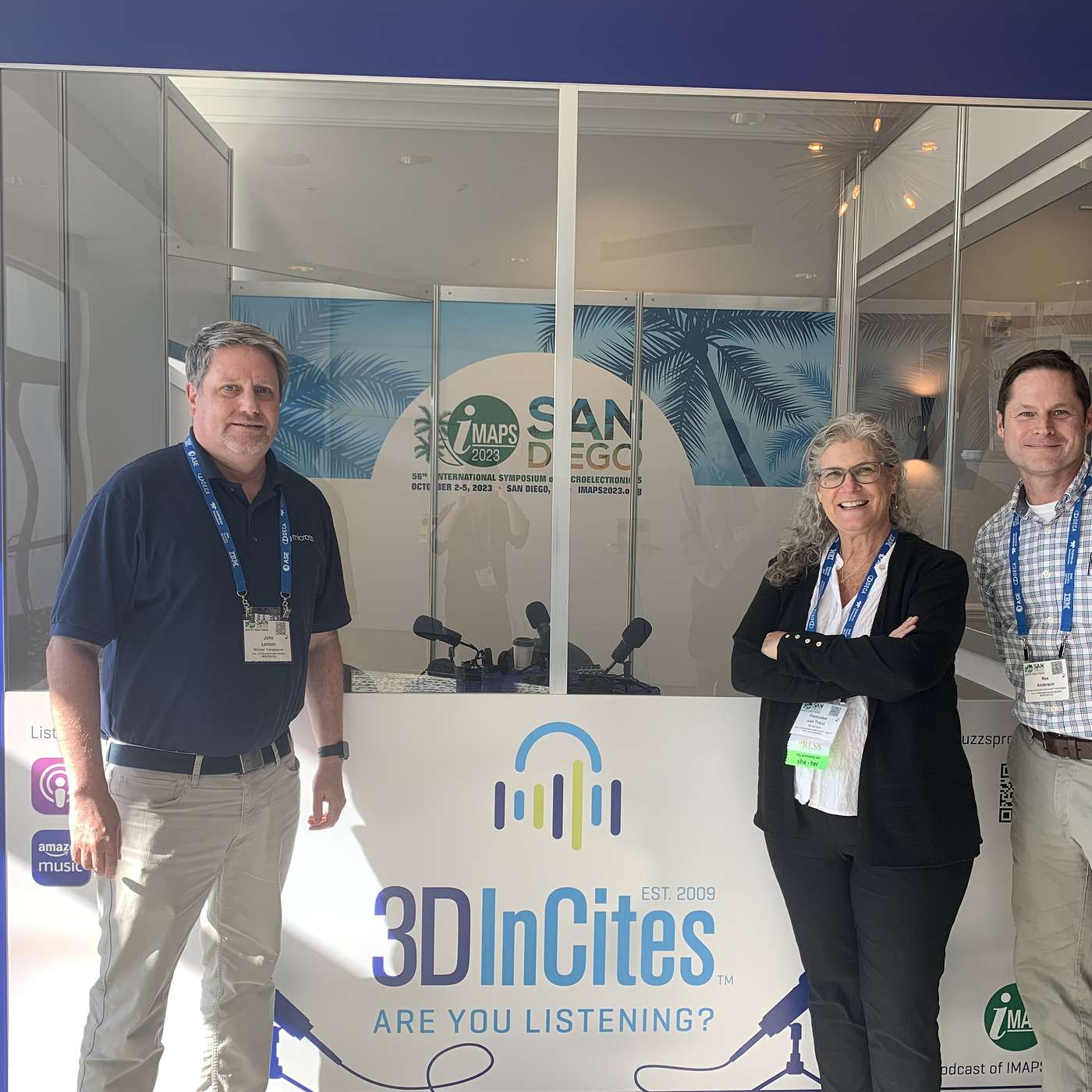
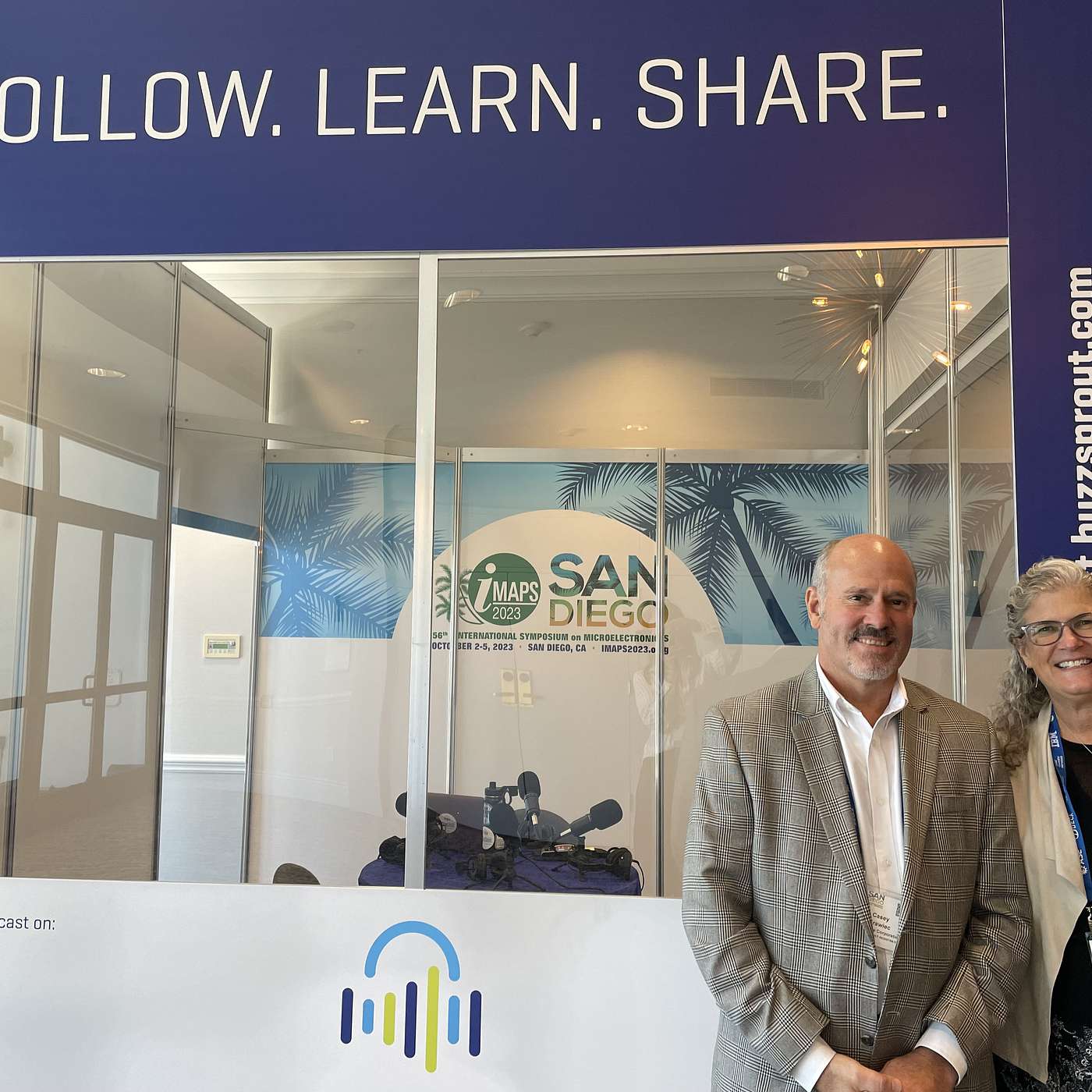
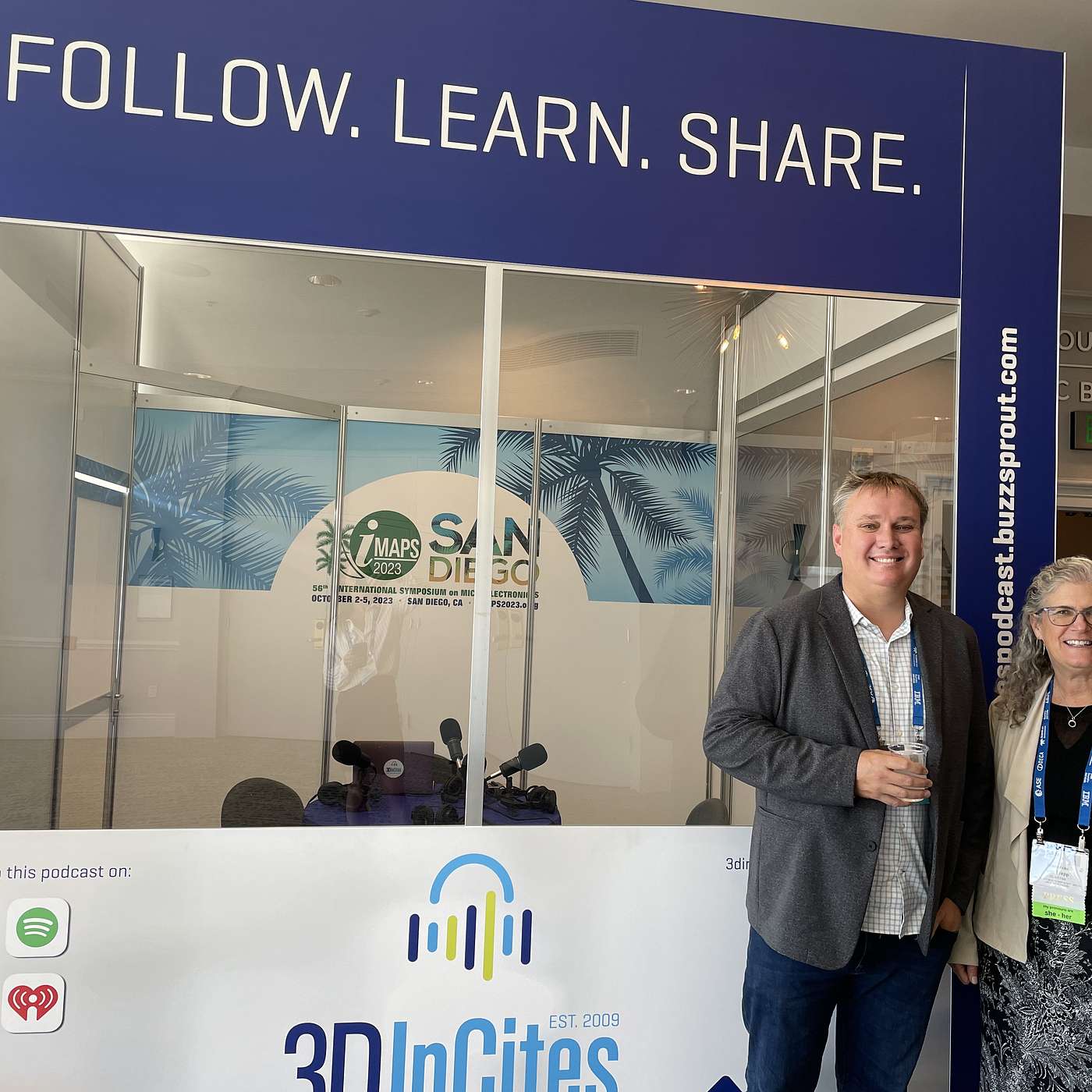
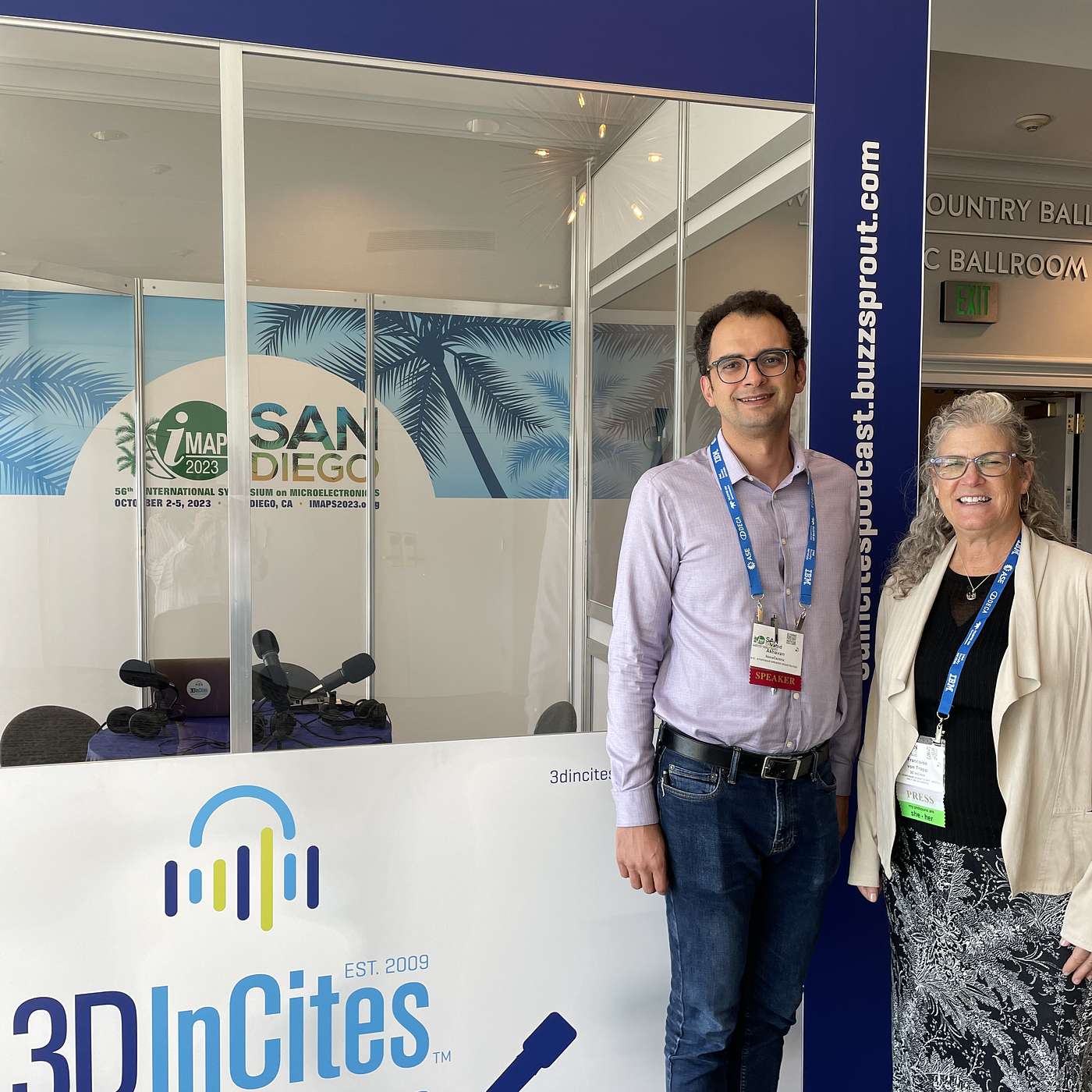
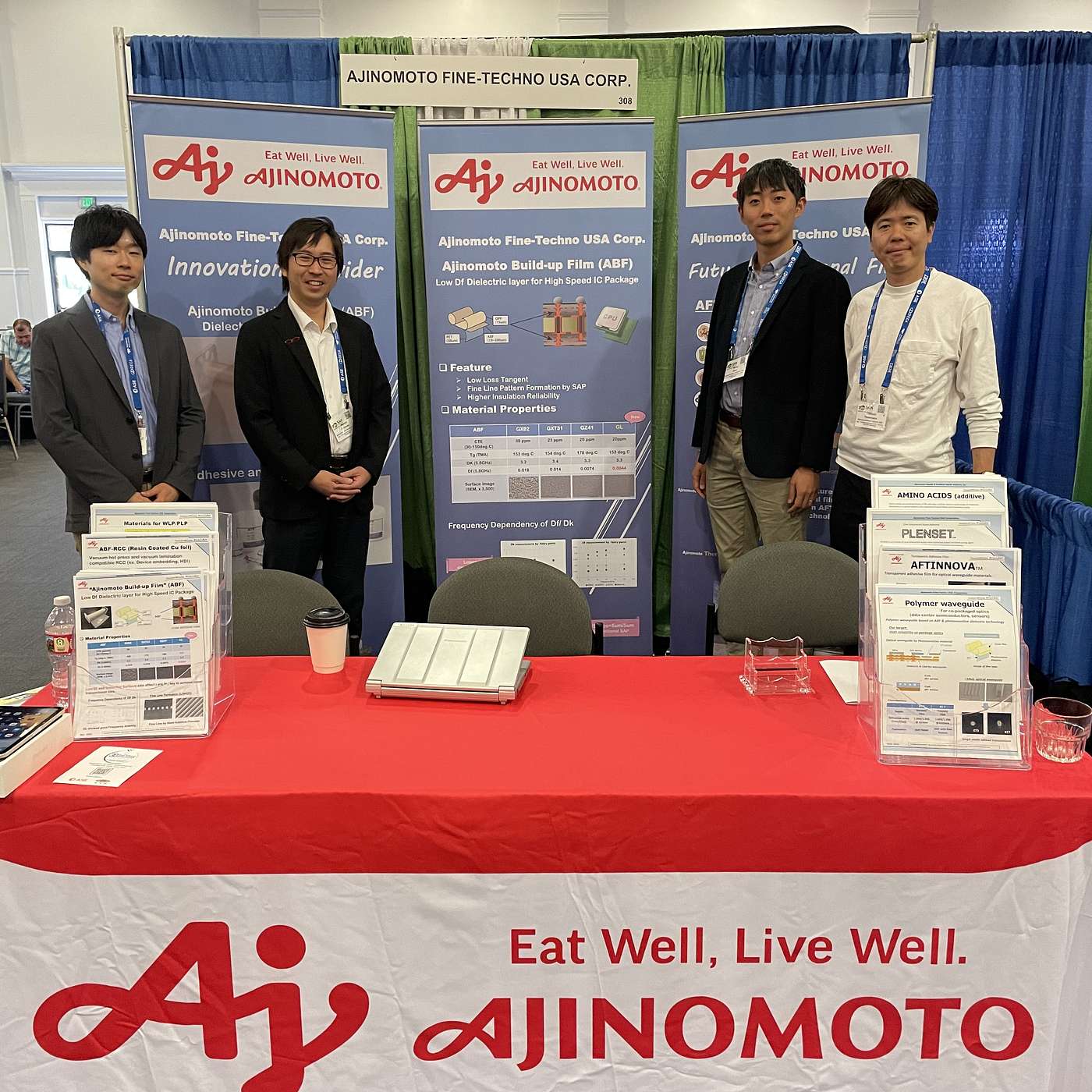
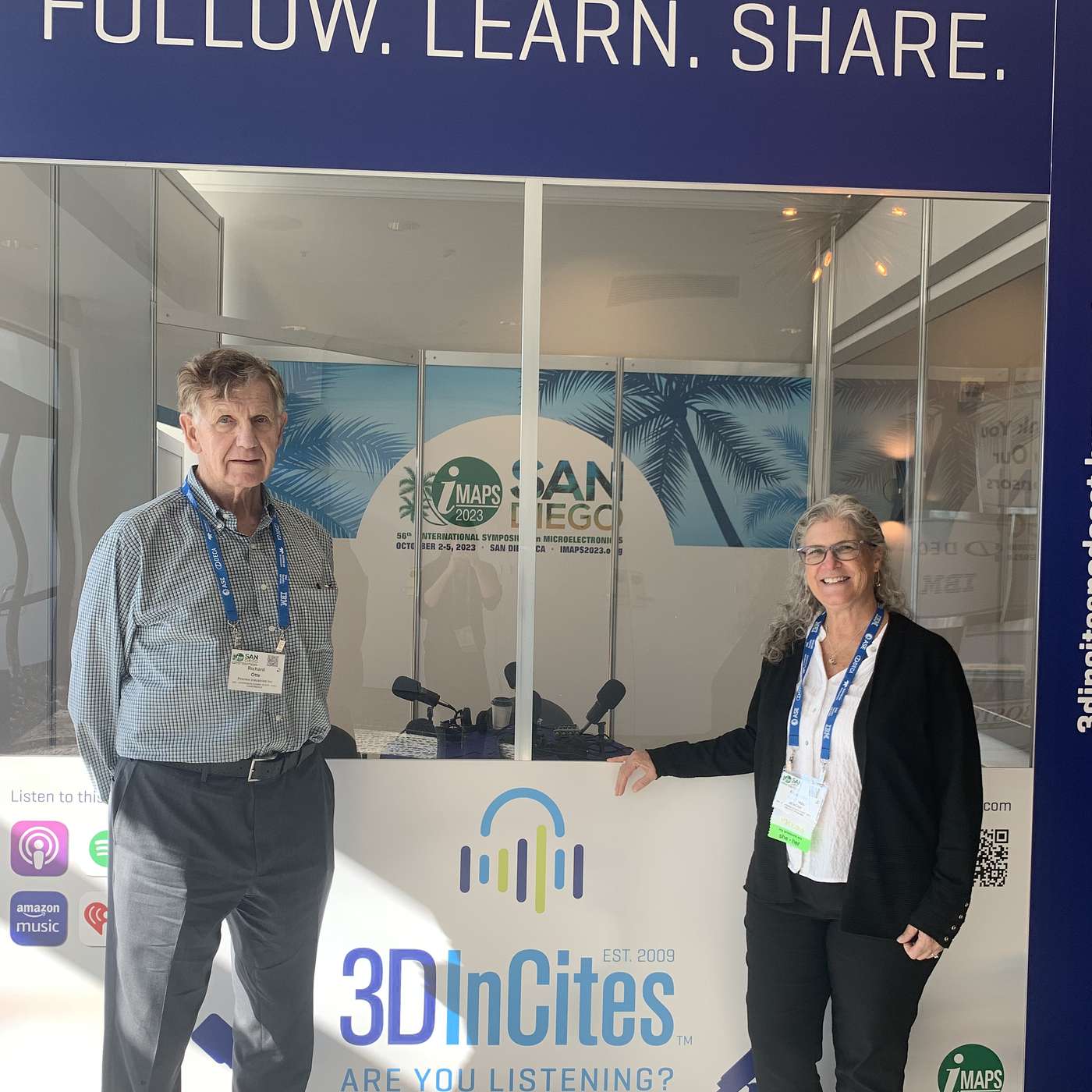
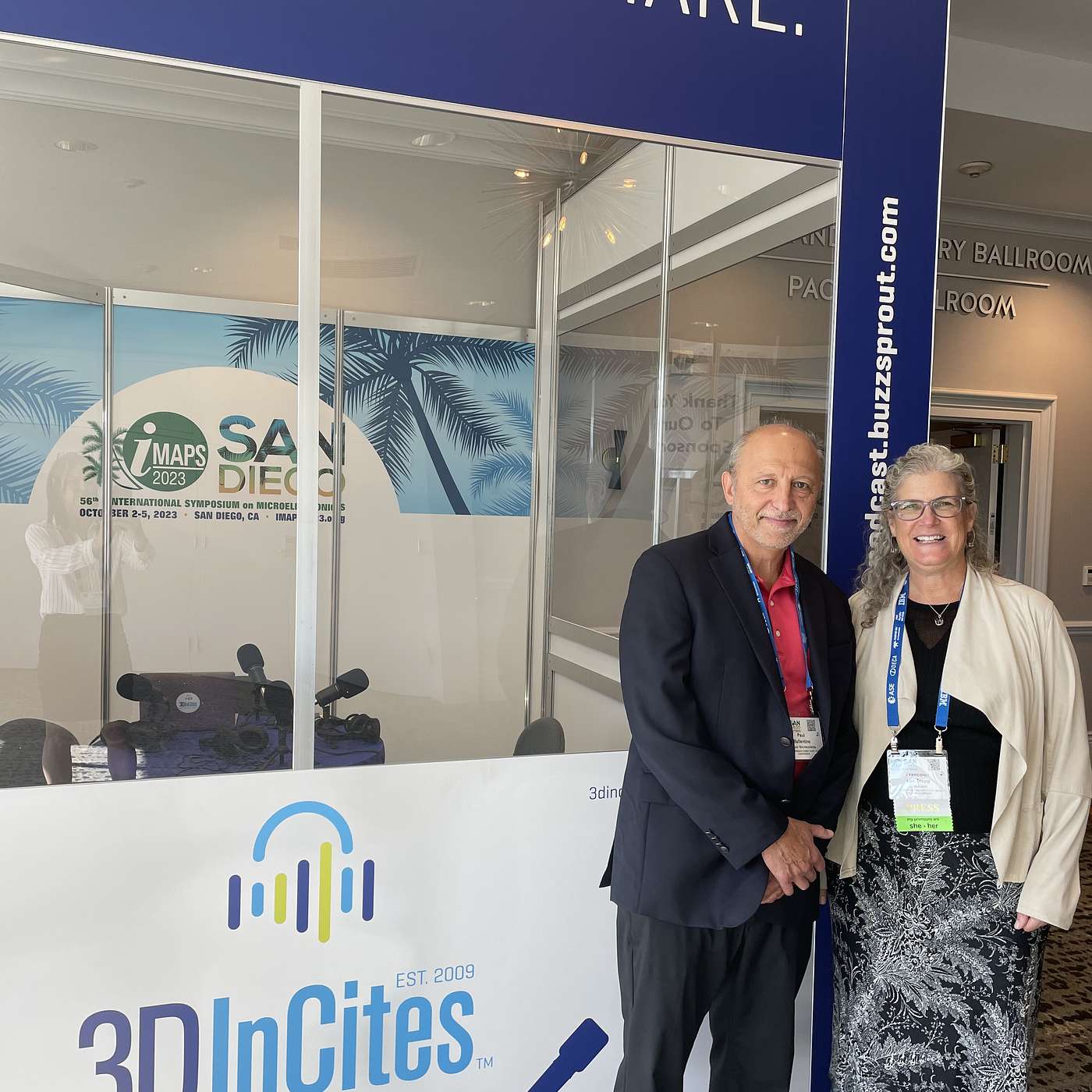
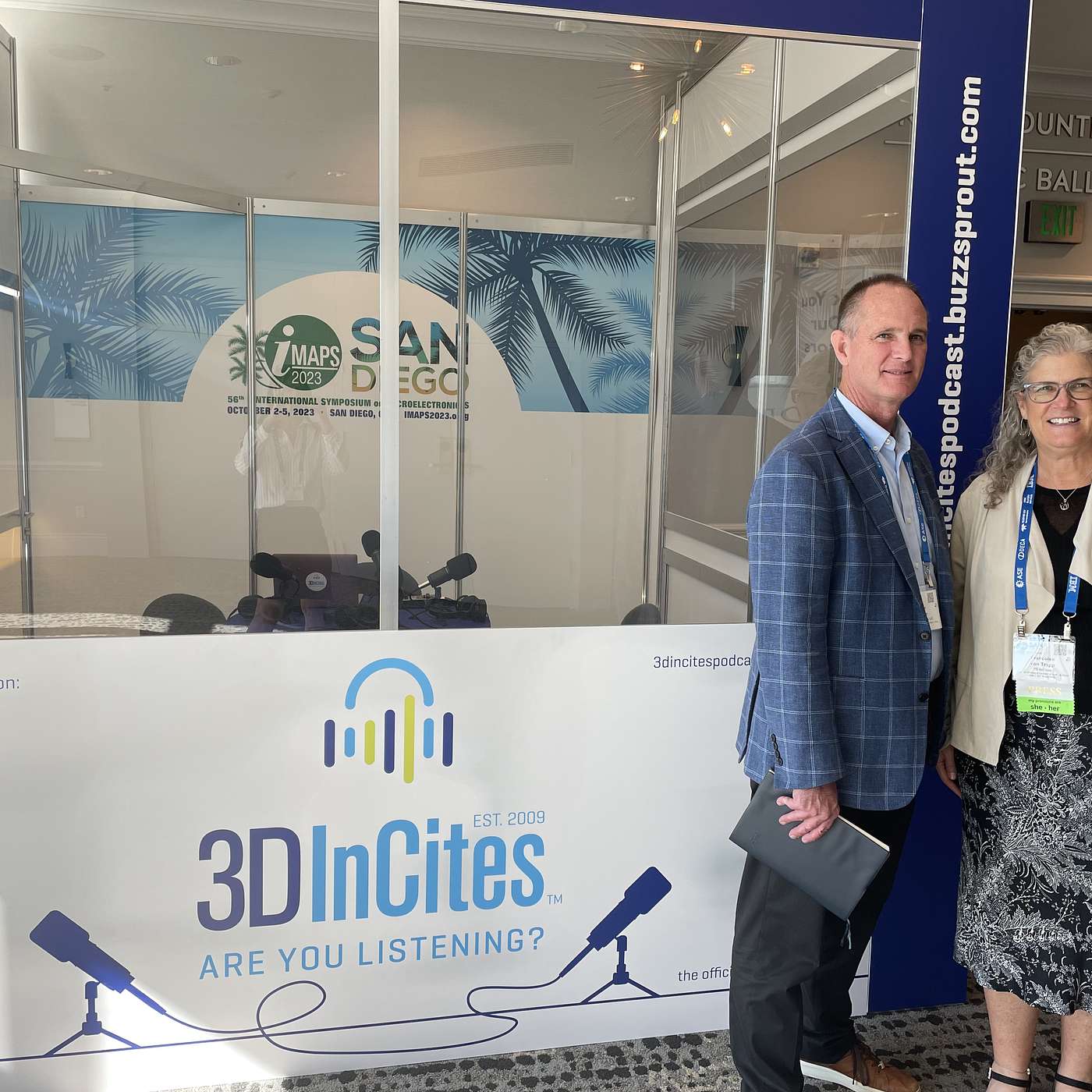
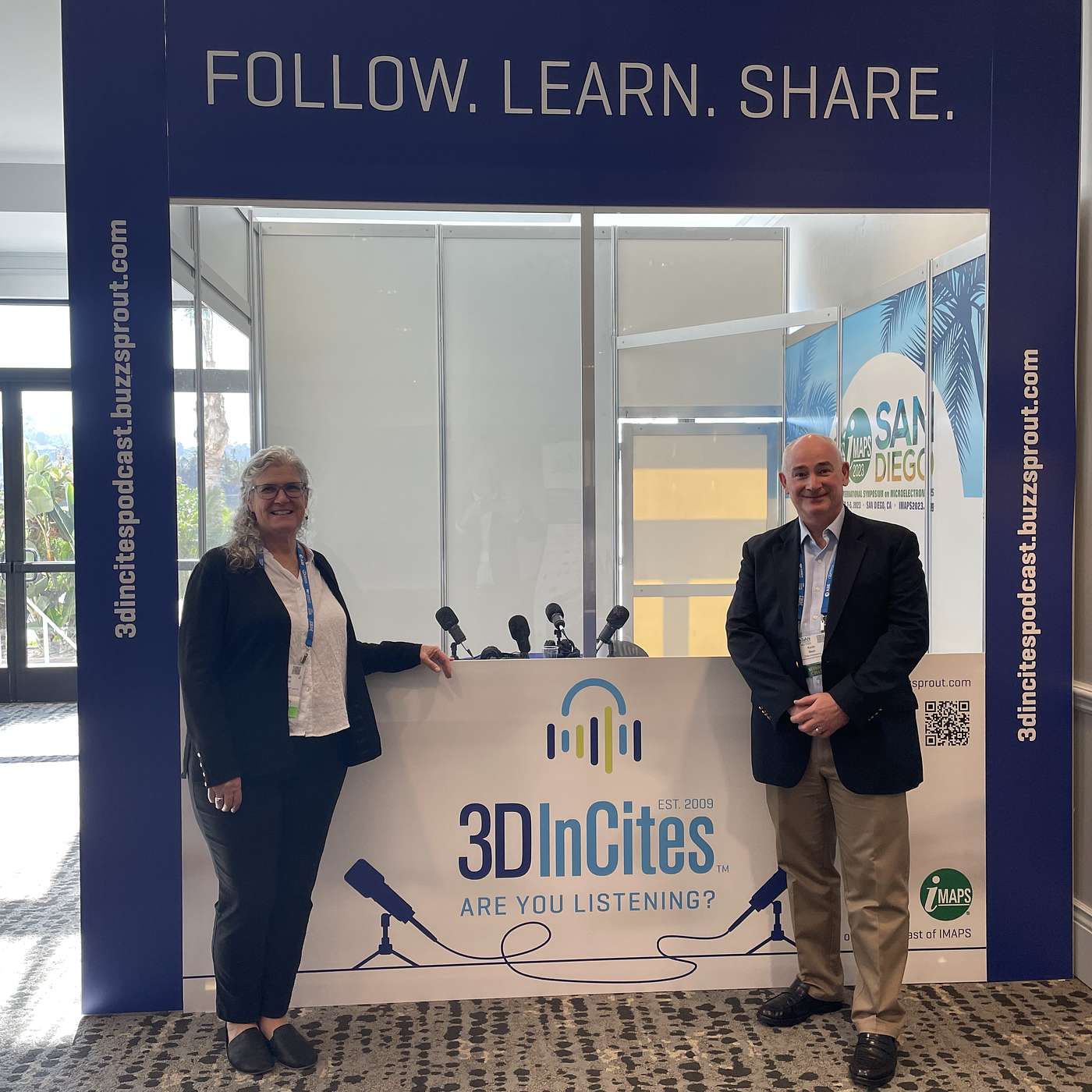
This Member Spotlight episode was recorded live at the IMAPS International Symposium. Françoise von Trapp speaks with community members who attended and exhibited about what they were showcasing, and what they learned.
John Lannon and Rex Anderson, Micross Components, helped demystify the multiple government funding efforts to onshore advanced packaging.
Casey Krawiec of StratEdge Corporation talks about the company’s role in delivering packaging technology for high-frequency applications.
Brian Schmaltz, Namics Corporation, talks about the company’s efforts to eliminate harmful PFAS chemicals from their portfolio of products.
Vahid Akhavan, PulseForge explains how the company’s core competency — high-powered photonic-based pulsed light technology — is being used for temporary bond/debond processes.
Ajinomoto Fine Techno’s Habib Hichri talked about developments beyond its core ABF (Ajinomoto Buil-up Film) to meet the needs of next-generation thin and large packages.
QP Technologies' CEO Dick Otte, explains why QP has decided to NOT pursue CHIPS for America Act funding.
Paul Ballentine, the co-founder of Mosaic Microsystems, talked about his involvement with the U.S. Government in building out the advanced packaging cluster in Rochester New York.
Peter Cronin, MRSI Systems, talked about the company’s latest foray into die-bonding tools – the MRSI 705 HF.
Onto Innovation’s Keith Best discussed the implications of Intel’s announcement that they’ve developed a glass core substrate technology for
An Acxiom podcast where we discuss marketing made better, bringing you real...
Listen on: Apple Podcasts Spotify
Digital Disruption with Geoff NielsonDiscover how technology is reshaping our lives and livelihoods.
Listen on: Apple Podcasts Spotify
Become a sustaining member!
Like what you hear? Follow us on LinkedIn and Twitter
Interested in reaching a qualified audience of microelectronics industry decision-makers? Invest in host-read advertisements, and promote your company in upcoming episodes. Contact Françoise von Trapp to learn more.
Interested in becoming a sponsor of the 3D InCites Podcast? Check out our 2024 Media Kit. Learn more about the 3D InCites Community and how you can become more involved.

IMAPS Leaders Talk About DEI Past, Present and Future
3D InCites Podcast
In this panel discussion, recorded live at the International Microelectronics and Packaging Society International Symposium, Françoise hands over the mike to Dan Krueger, Honeywell, as he moderates a panel on Diversity in Packaging, Past, Present, and Future. Don’t miss this lively town hall discussion on many important topics in today’s challenging work environment, including the important differences between equity and equality in the workplace.
You’ll hear representatives of different generations of IMAPS leadership discuss their experiences as women making careers in the microelectronics industry, the diverse perspectives that each generation experienced, the progress they see in the industry, and suggestions for work left to be done and how to achieve it. They also provide tips on how to improve DEI at companies going forward, the importance of mentorship, and how to be better allies to your peers.
Moderated by Daniel Krueger, Panelists include:
· Erica Folk, Northrop Grumman
· Susan Trulli, Retired from Raytheon
Next week, we wrap up our coverage of the IMAPS Symposium with our Member Spotlight episode, interviewing 3D InCites Community Members about what they showcased and what they learned at the event.
Real Talk About MarketingAn Acxiom podcast where we discuss marketing made better, bringing you real...
Listen on: Apple Podcasts Spotify
Digital Disruption with Geoff NielsonDiscover how technology is reshaping our lives and livelihoods.
Listen on: Apple Podcasts Spotify
Inspiring Tech Leaders - The Technology PodcastInterviews with Tech Leaders and insights on the latest emerging technology trends.
Listen on: Apple Podcasts Spotify
Become a sustaining member!
Like what you hear? Follow us on LinkedIn and Twitter
Interested in reaching a qualified audience of microelectronics industry decision-makers? Invest in host-read advertisements, and promote your company in upcoming episodes. Contact Françoise von Trapp to learn more.
Interested in becoming a sponsor of the 3D InCites Podcast? Check out our 2024 Media Kit. Learn more about the 3D InCites Community and how you can become more involved.

Conversations with the Next Generation of Advanced Packaging Experts
3D InCites Podcast
In a time when unprecedented industry growth is expected, the microelectronics industry is in the midst of a workforce shortage. To address this, the International Microelectronics and Packaging Society – IMAPS – is increasing its efforts to raise awareness about this rewarding industry through partnerships with universities and high schools.
Simultaneously, companies that serve the microelectronics industry are ramping up internship programs and coming up with new approaches to recruitment to help attract and retain young talent.
In this episode, recorded live at the IMAPS International Symposium on October 4, 2023, Françoise sits down with three high school students from the Carlsbad Highschool Robotics Clubs, Demetrios Dresios, Vaselios Dresios, and Kendra Ammon, who attended the event to learn more about the industry.
They talk about what got them interested in robotics, how it has shaped their ideas about careers, and what they want to study. They also talk about what they learned at the symposium.
Next, Françoise interviews Roberta Foster-Smith and Gabriela Philips, of Nordson Electronics Solutions, about Gabriela’s experience in Nordson’s Commercial Leadership Development program.
Next week, on the 3D InCites podcast, Françoise hands over the mike to Dan Krueger, Honeywell, as he moderates a panel on Diversity in Packaging, Past, Present and Future. Don’t miss this lively town hall discussion on many important topics in today’s challenging work environment, including the important differences between equity and equality in the workplace.
Become a sustaining member!
Like what you hear? Follow us on LinkedIn and Twitter
Interested in reaching a qualified audience of microelectronics industry decision-makers? Invest in host-read advertisements, and promote your company in upcoming episodes. Contact Françoise von Trapp to learn more.
Interested in becoming a sponsor of the 3D InCites Podcast? Check out our 2024 Media Kit. Learn more about the 3D InCites Community and how you can become more involved.

IMAPS Symposium 2023 Keynote Chats: Qorvo's Kevin Anderson, IBM Research's Jeffrey Burns, and ASE's C.P. Hung
3D InCites Podcast
This episode was recorded live at the 2023 IMAPS International Symposium, where the week’s keynote talks focused on different aspects of heterogeneous integration, packaging technology for high-performance computing, and what’s driving these technologies. Françoise von Trapp speaks with three of the keynote speakers who addressed attendees including Kevin Anderson, of Qorvo; Jeffrey Burns, of IBM Research; and C.P. Hung of ASE Group.
From Kevin Anderson, you’ll hear about Qorvo’s involvement in DARPA’s SHIP Program, and its Advanced State-of-the-Art RF Semiconductor Packaging Center that won them the 2023 3D InCites Award for Device Manufacturer of the Year. You’ll get Qorvo’s back story in being a supplier of wireless products and its focus on compound semiconductors. You’ll also learn about the difference between the SHIP Program and the CHIPS for America Act, and the role Qorvo plays.
From Jeff Burns, you’ll get detailed education on AI, and Deep Learning. Using the development of image recognition as an example of how AI can surpass human capabilities, he explains the advantages of AI accelerators, and how IBM’s work in foundation models is democratizing AI applications. He also explains the role 3D heterogeneous integration and chiplet architectures in making this happen.
From CP Hung, you’ll get a history lesson on the different types of advanced packages that are available to solve different challenges presented by today’s applications. Specifically, you’ll learn about the needs of Electric Vehicles, and how heterogeneous integration is addressing these needs. You’ll also learn about ASE’s launch of its Integrated Design Ecosystem (IDE) a collaborative design toolset optimized to systematically boost advanced package architecture across the VIPack™ platform.
Real Talk About MarketingAn Acxiom podcast where we discuss marketing made better, bringing you real...
Listen on: Apple Podcasts Spotify
Digital Disruption with Geoff NielsonDiscover how technology is reshaping our lives and livelihoods.
Listen on: Apple Podcasts Spotify
IMAPS InternationalIMAPS is the largest society dedicated to microelectronics and electronics packaging advancement.
Disclaimer: This post contains affiliate links. If you make a purchase, I may receive a commission at no extra cost to you.
Become a sustaining member!
Like what you hear? Follow us on LinkedIn and Twitter
Interested in reaching a qualified audience of microelectronics industry decision-makers? Invest in host-read advertisements, and promote your company in upcoming episodes. Contact Françoise von Trapp to learn more.
Interested in becoming a sponsor of the 3D InCites Podcast? Check out our 2024 Media Kit. Learn more about the 3D InCites Community and how you can become more involved.

100th Episode: Talking with Erica Folk and Tarak Railkar About The 2023 IMAPS Symposium
3D InCites Podcast
You are now listening to the 100th Episode of the 3D InCites Podcast! To celebrate, Françoise sits down with Erica Folk and Tarak Railkar, both representatives of the International Microelectronics and Packaging Society – also known as IMAPS. 3D InCites is the official Industry Partner of IMAPS and the Official podcast of the IMAPS Symposium.
In this episode, you’ll get a look behind the scenes of this largely volunteer-led organization, and the opportunities the Society provides its members. Folk, incoming IMAPS president, talks about the work her predecessor, Beth Keser, set in motion, particularly around workforce development, that she intends to keep moving forward during her two-year term.
As General Chair-Elect, Railkar leads the technical committee, and provides some insight on the latest drivers that inspire the topics addressed in the Keynote talks and technical program for this year's IMAPS International Symposium, which takes place October 2-5 in San Diego, CA.
He explains how attendees contribute to the topic selection through survey participation, what led to this year’s focus on Artificial Intelligence, and how it impacts the microelectronics industry. There's a Keynote talk dedicated AI, a professional development course, as well as a panel discussion.
Conversation also focuses on the DEI Panel discussion, as well as student participation, the growing popularity of poster sessions, networking opportunities, and how to take advantage of all that is available. You’ll also get some valuable tips on how to network effectively!
To learn more about the IMAPS Symposium, and register, visit the website.
Contact Our Guests
- Erica Folk, President-elect, IMAPS (Manager, MMIC and RFIC Design, Northrop Grumman)
- Tarak Railkar, General Chair-elect, IMAPS International Symposium (Principal Packaging Engineer / SMTS, Qorvo)
Next week, on the 3D InCites podcast, we’ll be bringing you the 3D InCites 411 – Ask me Anything, with me, Françoise von Trapp. I’ll be speaking abou
Real Talk About MarketingAn Acxiom podcast where we discuss marketing made better, bringing you real...
Listen on: Apple Podcasts Spotify
IMAPS InternationalIMAPS is the largest society dedicated to microelectronics and electronics packaging advancement.
Disclaimer: This post contains affiliate links. If you make a purchase, I may receive a commission at no extra cost to you.
Become a sustaining member!
Like what you hear? Follow us on LinkedIn and Twitter
Interested in reaching a qualified audience of microelectronics industry decision-makers? Invest in host-read advertisements, and promote your company in upcoming episodes. Contact Françoise von Trapp to learn more.
Interested in becoming a sponsor of the 3D InCites Podcast? Check out our 2024 Media Kit. Learn more about the 3D InCites Community and how you can become more involved.

A Conversation with Beth Keser About Writing A Book on Advanced Fanout Wafer Level Packaging
3D InCites Podcast
In this episode, Françoise speaks with Beth Keser, Ph.D., about her latest book co-authored with Steffen Kröhnert, ESPAT Consulting.
Embedded and Fan-Out Wafer and Panel Level Packaging Technologies for Advanced Application Spaces was published in December 2021. It is essentially a companion to the wafer-level packaging handbook titled, Advances in Embedded and Fan-Out Wafer-Level Packaging Technologies, which the duo published in 2019. This book picks up where the first one left off, with 11 new chapters including contributions from some of the same companies that participated before, as well as new ones.
The book examines the advantages of Embedded and FO-WLP technologies, potential application spaces, package structures available in the industry, process flows, and material challenges, and is filled with contributions from some of the field’s leading experts.
In the interview, Beth talks about the book’s backstory, why and how it was written, and who participated. She also explains why they decided to begin the book with a market report, and how the book is a snapshot in time.
Contact Beth Keser on LinkedIn
Order your own copy of Embedded and Fan-Out Wafer and Panel Level Packaging Technologies for Advanced Application Spaces.
Become a sustaining member!
Like what you hear? Follow us on LinkedIn and Twitter
Interested in reaching a qualified audience of microelectronics industry decision-makers? Invest in host-read advertisements, and promote your company in upcoming episodes. Contact Françoise von Trapp to learn more.
Interested in becoming a sponsor of the 3D InCites Podcast? Check out our 2024 Media Kit. Learn more about the 3D InCites Community and how you can become more involved.

A Conversation about Addressing Material Challenges for Electric Mobility Technology
3D InCites Podcast
According to the International Energy Agency, road transportation accounts for 16% of global emissions. Electric vehicles are the key technology to decarbonize this. The EIA estimates that EVs will account for 13% of new cars sold in 2022. Many countries are setting goals to eliminate combustion engine cars to reach Net Zero emissions by 2050. But there are a lot of challenges to iron out before EVs achieve critical mass. For example, one area of interest for this week’s podcast guests is the materials used to manufacture EV power modules.
In this episode, Françoise von Trapp talks with Indium’s Pei Lim and Dean Payne about these challenges, particularly why pressure silver sintering is becoming a popular approach for die attach in power packaging applications.
You’ll learn how eMobility has impacted manufacturing power modules and the origin of silver sintering in these devices. You’ll learn about the materials currently used in sintering, and why silver is a better choice for electric vehicles. Lastly, you’ll learn about Indium’s pressure sinter offering and its benefits.
Learn more about pressure silver sintering here.
Contact today’s guests on LinkedIn:
Sze Pei Lim, Senior Global Product Manager, Indium Corporation
Dean Payne, Semiconductor Product Manager, Indium Corporation.
Indium CorporationIndium Corporation's materials solutions serve the semiconductor, e-mobility, and thermal markets.
Disclaimer: This post contains affiliate links. If you make a purchase, I may receive a commission at no extra cost to you.
Become a sustaining member!
Like what you hear? Follow us on LinkedIn and Twitter
Interested in reaching a qualified audience of microelectronics industry decision-makers? Invest in host-read advertisements, and promote your company in upcoming episodes. Contact Françoise von Trapp to learn more.
Interested in becoming a sponsor of the 3D InCites Podcast? Check out our 2024 Media Kit. Learn more about the 3D InCites Community and how you can become more involved.

The IMAPS DEI Panel Discusses the Difference between Equality and Equity
3D InCites Podcast
For this episode, recorded during the IMAPS International Symposium, Françoise von Trapp hands over the mike to Robin Davis, of 3D InCites Member company, Deca.
Davis organized and moderated a Diversity, Equity, and Inclusion town hall discussion during IMAPS, on the topic of Equality vs. Equity. A distinguished panel of industry veterans shared their perceptions and personal stories, including Jean Trewhella, GlobalFoundries; Susan Trulli, Raytheon; Shelby Nelson, Mosaic Microsystems; Urmi Ray, Saras Micro Devices, and KT Moore, Cadence.
Davis provided a framework for the conversation, explaining the difference between Equal and Equity: Equality means each employee gets the same bicycle to ride, and equity means that everyone gets the bicycle that suits their needs. The panelists then also offered tips for how to overcome our own unconscious bias to create a culture of DEI at our own workplaces.
Contact the Panelists on LinkedIn
Robin Davis, Deca
Jean Trewhella, GlobalFoundries
Susan Trulli, Ratheon
An Acxiom podcast where we discuss marketing made better, bringing you real...
Listen on: Apple Podcasts Spotify
Digital Disruption with Geoff NielsonDiscover how technology is reshaping our lives and livelihoods.
Listen on: Apple Podcasts Spotify
Inspiring Tech Leaders - The Technology PodcastInterviews with Tech Leaders and insights on the latest emerging technology trends.
Listen on: Apple Podcasts Spotify
DecaDeca's technology empowers the transformation of electronic interconnects for the chiplet era.
Disclaimer: This post contains affiliate links. If you make a purchase, I may receive a commission at no extra cost to you.
Become a sustaining member!
Like what you hear? Follow us on LinkedIn and Twitter
Interested in reaching a qualified audience of microelectronics industry decision-makers? Invest in host-read advertisements, and promote your company in upcoming episodes. Contact Françoise von Trapp to learn more.
Interested in becoming a sponsor of the 3D InCites Podcast? Check out our 2024 Media Kit. Learn more about the 3D InCites Community and how you can become more involved.

Member Spotlight: Conversations from 2022 MAPS International Symposium
3D InCites Podcast
25 of our community members participated in the 2022 IMAPS International Symposium in Boston, MA, which was held during the first week of October. This episode features conversations about what they were presenting and showcasing, and what they learned during the week.
Craig North, of Gel-Pak, is on a mission to find out as much as he can about chiplet processes and technology, to identify gaps that can be filled by Gel Pak products and services.
Bob Connor and Kevin Oswalt of X-Celeprint. Kevin talked about the paper he presented at IMAPS on micro-transfer printing (MTP) at the conference and creating the III_V heterogeneous integration ecosystem.
Bill Acito, of Member company Siemens, presented on silicon substrate design for BGA designers.
Carlotta Baumann, the new CEO of Finetech, talks about stepping into the role in the midst of COVID, and into the shoes of a 22-year ve
Real Talk About MarketingAn Acxiom podcast where we discuss marketing made better, bringing you real...
Listen on: Apple Podcasts Spotify
Digital Disruption with Geoff NielsonDiscover how technology is reshaping our lives and livelihoods.
Listen on: Apple Podcasts Spotify
Inspiring Tech Leaders - The Technology PodcastInterviews with Tech Leaders and insights on the latest emerging technology trends.
Listen on: Apple Podcasts Spotify
IMAPS InternationalIMAPS is the largest society dedicated to microelectronics and electronics packaging advancement.
Disclaimer: This post contains affiliate links. If you make a purchase, I may receive a commission at no extra cost to you.
Become a sustaining member!
Like what you hear? Follow us on LinkedIn and Twitter
Interested in reaching a qualified audience of microelectronics industry decision-makers? Invest in host-read advertisements, and promote your company in upcoming episodes. Contact Françoise von Trapp to learn more.
Interested in becoming a sponsor of the 3D InCites Podcast? Check out our 2024 Media Kit. Learn more about the 3D InCites Community and how you can become more involved.

Keynote Conversations from the 2022 IMAPS International Symposium
3D InCites Podcast
in this episode, Françoise von Trapp interviews three of the keynote speakers who presented during the 2022 IMAPS International Symposium. Featured guests include Lionel Kimmerling, Dr. Anu Agarwal (MIT Microphotonics Center); Glenn Daves (NXP), and Dave Bolognia (Analog Devices).
We’re back on the road – recording a series of episodes at the IMAPS International Symposium. In this first episode, Françoise interviews some of the keynote speakers to capture the highlights of their talks.
First up, is Lionel Kimmerling, Thomas Lord Professor of Materials Science and Engineering Director at MIT Microphotonics Center, and his colleague, Dr. Anu Agarwal, MIT – Director of Electric Photonic Packaging and principal research scientist. They explain the basics of Si photonics and co-packaged optics, and the advantages and opportunities of electronic-photonic package integration, which is expected to be the next big technology transition in the IC field, particularly when it comes to chip stacking.
Additionally, Dr. Agarwal talks about a partnership between the Microphotonics Center and IMAPS to provide an educational setting to provide hands-on-training to help the packaging engineer workforce to develop the new skills
Glenn Daves of NXP gave the keynote on Day 2 on the topic of 6G – It’s Opportunities and Packaging Challenges. He talks about the promise of 6G and why it’s more than just another “G” and explains what the plans are for 6G applications. We also talk about all that needs to be accomplished to stay on track to integrate 6G into the wireless offerings, and what’s needed specifically from the packaging community t support it. Lastly, he talks about the importance of semiconductor sustainability and the opportunity to design sustainability into 6G from the get-go.
Real Talk About MarketingAn Acxiom podcast where we discuss marketing made better, bringing you real...
Listen on: Apple Podcasts Spotify
Digital Disruption with Geoff NielsonDiscover how technology is reshaping our lives and livelihoods.
Listen on: Apple Podcasts Spotify
IMAPS InternationalIMAPS is the largest society dedicated to microelectronics and electronics packaging advancement.
Disclaimer: This post contains affiliate links. If you make a purchase, I may receive a commission at no extra cost to you.
Become a sustaining member!
Like what you hear? Follow us on LinkedIn and Twitter
Interested in reaching a qualified audience of microelectronics industry decision-makers? Invest in host-read advertisements, and promote your company in upcoming episodes. Contact Françoise von Trapp to learn more.
Interested in becoming a sponsor of the 3D InCites Podcast? Check out our 2024 Media Kit. Learn more about the 3D InCites Community and how you can become more involved.

A Conversation with Christine Whitman About Breaking Through The Semiconductor Glass Ceiling
3D InCites Podcast
It’s no secret that semiconductors are very much a male-dominated industry. In fact, according to Zippia, only 10.7% of engineers working in the semiconductor industry are women. And according to Deloitte and Touche’s Women in the Workplace, women are still vastly underrepresented at all levels of management. In this episode, Françoise von Trapp talks with Christine Whitman, a semiconductor executive who has broken through these barriers. She’s the chairman and CEO of our member company. Mosaic Microsystems.
In this episode, Christine shares her origin story. She talks about what inspired her to pursue a career in semiconductors, and the career path she took that resulted in her buying her first company. A self-described serial entrepreneur, she talks about her passion for materials science, what she looks for when investing in a start-up, and what led her to found Mosaic Microsystems. She also shares her vision for the future, and advice for women looking to shatter the glass ceiling.
About Mosaic Microsystems
Mosaic is pioneering thin glass for packaging and interposer applications in fields ranging from millimeter-wave communications to artificial intelligence and photonics. Thin glass has outstanding mechanical and electrical properties for today’s packaging applications, but adoption has been slow due to its fragility and flexibility. Mosaic’s Viaffirm handling solution eliminates these roadblocks by making thin glass compatible with standard semiconductor processes. Viaffirm also provides a platform for through glass vias and void-free via fill, enabling glass-based interposers with capabilities normally reserved for silicon.
Learn more about Christine Whitman here.
An Acxiom podcast where we discuss marketing made better, bringing you real...
Listen on: Apple Podcasts Spotify
Mosaic Microsystems: The Future is ClearThin glass solutions for next-generation microelectronics and photonics packaging.
Disclaimer: This post contains affiliate links. If you make a purchase, I may receive a commission at no extra cost to you.
Become a sustaining member!
Like what you hear? Follow us on LinkedIn and Twitter
Interested in reaching a qualified audience of microelectronics industry decision-makers? Invest in host-read advertisements, and promote your company in upcoming episodes. Contact Françoise von Trapp to learn more.
Interested in becoming a sponsor of the 3D InCites Podcast? Check out our 2024 Media Kit. Learn more about the 3D InCites Community and how you can become more involved.

Conversations from the IMAPS International Symposium - Part Three
3D InCites Podcast
This week, we’re wrapping up our conversations from the IMAPS International Symposium, with an extended episode. The questions I’m asking? How have the events of the last 18 months impacted the future of the semiconductor industry, and what are the three things we should be focusing on in advanced packaging right now?
You’ll hear from Jan Vardaman of TechSearch International; Ram Trichur of Henkel Corporation; Curtis Zwenger of Amkor Technology; Robert Avila, Finetech; Jon Medernach, MRSI; Dhiraj Bora, Silitronics; and Craig North, GelPak.
How have the events of the last 18 months impacted the future of the semiconductor industry?
Top of everyone’s mind for question one are things like adjusting to working from home, how tool suppliers adjusted their manufacturing, how the industry thrived despite the challenges, returning to in-person events and what that looks like, securing the semiconductor supply chain, sustainable semiconductor manufacturing, the geopolitical situation, the push to onshoring manufacturing to the US, rebuilding the microelectronics workforce.
What are the three things we should be focusing on in advanced packaging right now?
The importance of collaboration and consortia for heterogeneous integration; silicon photonics; chiplet integration and the need for standardization; increased package size and the implications for materials; advanced node technologies making it to the automotive industry, and much more.
You can connect with today’s speakers on LinkedIn.
- Jan Vardman, TechSearch International*
- Ram Trichur, Henkel Corporation*
- Curtis Zwenger, Amkor Technology*
- Robert Avila, Finetech*
- Jon Medernach, MRSI Systems
- Dhiraj Borah, Silitronics
- Mark Gerber, ASE Group*
- Craig North, GelPak
* 3D InCites Community Members
KiterocketA global strategic marketing agency serving the semiconductor and sustainability industries.
Disclaimer: This post contains affiliate links. If you make a purchase, I may receive a commission at no extra cost to you.
Become a sustaining member!
Like what you hear? Follow us on LinkedIn and Twitter
Interested in reaching a qualified audience of microelectronics industry decision-makers? Invest in host-read advertisements, and promote your company in upcoming episodes. Contact Françoise von Trapp to learn more.
Interested in becoming a sponsor of the 3D InCites Podcast? Check out our 2024 Media Kit. Learn more about the 3D InCites Community and how you can become more involved.

Conversations from the IMAPS International Symposium - Part Two
3D InCites Podcast
If you liked Part 1 of Conversations from the IMAPS Symposium, you’re going to love part 2. While my questions are the same, the responses are quite varied. In this episode, you’ll hear from Andy Mackie of Indium Corporation, and Dirk Friebel, of Fraunhofer Institute, as we wrap up Day one of coverage. We’ll also give you a sneak peek of Day 2 with a conversation with Tom Gregorich of Zeiss Process Control Solutions.
So what are these questions? First, I asked how the events of the last 18 months have shaped the future of the semiconductor industry. Second, I asked what are three things that are impacting advanced packaging right now. In this episode, these questions sparked conversation around navigating through the pandemic, the return to in-person events, Fraunhofer’s presence in the USA and what it means, how electric vehicles are impacting advanced packaging requirements, who’s going to handle chiplet assembly, advancements in thermal interface materials, the need for inline X-ray inspection for high volume manufacturing, and all sorts of other things.
Thank you to today’s guests! Here’s where you can find them on LinkedIN:
· Andy Mackie, Indium Corporation
· Dirk Friebel, Fraunhofer Institute
· Tom Gregorich, Zeiss Process Control
KiterocketA global strategic marketing agency serving the semiconductor and sustainability industries.
Disclaimer: This post contains affiliate links. If you make a purchase, I may receive a commission at no extra cost to you.
Become a sustaining member!
Like what you hear? Follow us on LinkedIn and Twitter
Interested in reaching a qualified audience of microelectronics industry decision-makers? Invest in host-read advertisements, and promote your company in upcoming episodes. Contact Françoise von Trapp to learn more.
Interested in becoming a sponsor of the 3D InCites Podcast? Check out our 2024 Media Kit. Learn more about the 3D InCites Community and how you can become more involved.

Conversations from the IMAPS International Symposium - Part 1
3D InCites Podcast
We’re changing things up a bit for the next few weeks with a series of podcast episodes recorded live at the IMAPS International Symposium in San Diego. How we've missed those live events and the hallway conversations! We figured you did too, so we convinced some of our colleagues to sit down with Françoise and record them.
In this first episode, we talk with two of the panelists from Monday night’s Diversity and Inclusion Town Hall. Nicole Wongk of Honeywell is putting her chemical engineering background to work in advanced packaging and assembly. She's active in the company's Diversity and Inclusion initiative. Marqus Patton, a software analyst at Accenture Federal Service, is VP of the San Diego Chapter of the National Society of Black Engineers.
Next, I spoke with Cadence’s KT Moore, who delivered the only In-person keynote. KT is very active in Cadence’s DEI efforts, so we talked a bit about that before diving into the two questions that I asked everyone I spoke with – how have the events of the last 18 months shaped the future of the semiconductor industry. And what are the three things happening in Advanced Packaging right now that we should be watching? Everyone had something different to say – the next two episodes will feature the rest of those conversations. Here we go….
Contact our Speakers on Linked In:
A global strategic marketing agency serving the semiconductor and sustainability industries.
Disclaimer: This post contains affiliate links. If you make a purchase, I may receive a commission at no extra cost to you.
Become a sustaining member!
Like what you hear? Follow us on LinkedIn and Twitter
Interested in reaching a qualified audience of microelectronics industry decision-makers? Invest in host-read advertisements, and promote your company in upcoming episodes. Contact Françoise von Trapp to learn more.
Interested in becoming a sponsor of the 3D InCites Podcast? Check out our 2024 Media Kit. Learn more about the 3D InCites Community and how you can become more involved.

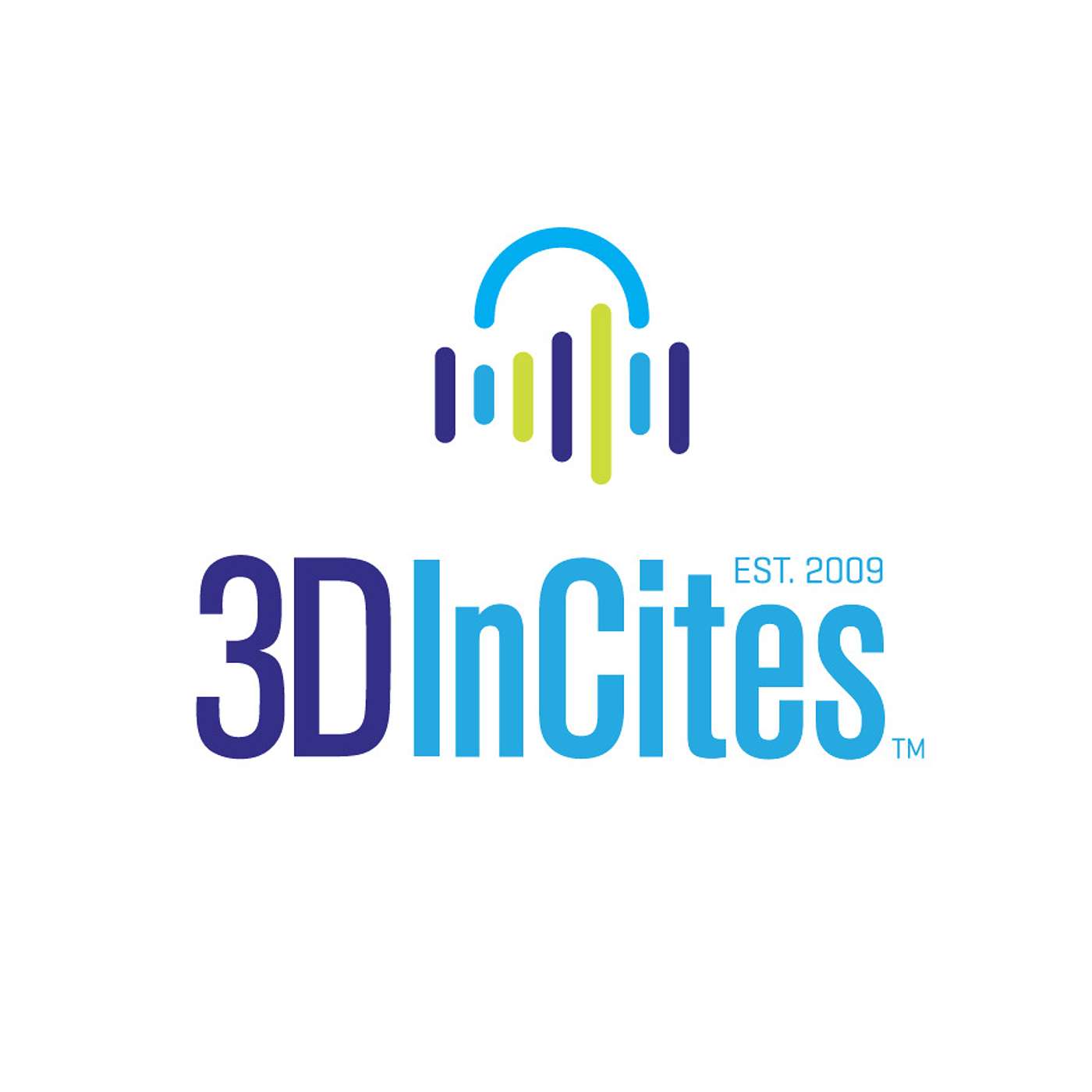 LIVE from Boston MA: Member Highlights from IMAPS Symposium 2024
1:26:09
LIVE from Boston MA: Member Highlights from IMAPS Symposium 2024
1:26:09
 IMAPS Society Award Winners Talk About How Belonging to IMAPS Enriched Their Microelectronics Careers
20:30
IMAPS Society Award Winners Talk About How Belonging to IMAPS Enriched Their Microelectronics Careers
20:30
 Live from IMAPS Symposium 2024: Updates on the NAPMP, Silicon Photonics and RDL Packaging
49:14
Live from IMAPS Symposium 2024: Updates on the NAPMP, Silicon Photonics and RDL Packaging
49:14
 Tarak Railkar and Benson Chan Preview IMAPS Symposium 2024
23:40
Tarak Railkar and Benson Chan Preview IMAPS Symposium 2024
23:40
 Member Spotlight: Conversations from IMAPS 2023
1:16:17
Member Spotlight: Conversations from IMAPS 2023
1:16:17
 IMAPS Leaders Talk About DEI Past, Present and Future
53:33
IMAPS Leaders Talk About DEI Past, Present and Future
53:33
 Conversations with the Next Generation of Advanced Packaging Experts
22:55
Conversations with the Next Generation of Advanced Packaging Experts
22:55
 IMAPS Symposium 2023 Keynote Chats: Qorvo's Kevin Anderson, IBM Research's Jeffrey Burns, and ASE's C.P. Hung
41:27
IMAPS Symposium 2023 Keynote Chats: Qorvo's Kevin Anderson, IBM Research's Jeffrey Burns, and ASE's C.P. Hung
41:27
 100th Episode: Talking with Erica Folk and Tarak Railkar About The 2023 IMAPS Symposium
30:43
100th Episode: Talking with Erica Folk and Tarak Railkar About The 2023 IMAPS Symposium
30:43
 A Conversation with Beth Keser About Writing A Book on Advanced Fanout Wafer Level Packaging
21:35
A Conversation with Beth Keser About Writing A Book on Advanced Fanout Wafer Level Packaging
21:35
 A Conversation about Addressing Material Challenges for Electric Mobility Technology
15:34
A Conversation about Addressing Material Challenges for Electric Mobility Technology
15:34
 The IMAPS DEI Panel Discusses the Difference between Equality and Equity
1:04:00
The IMAPS DEI Panel Discusses the Difference between Equality and Equity
1:04:00
 Member Spotlight: Conversations from 2022 MAPS International Symposium
1:06:50
Member Spotlight: Conversations from 2022 MAPS International Symposium
1:06:50
 Keynote Conversations from the 2022 IMAPS International Symposium
48:08
Keynote Conversations from the 2022 IMAPS International Symposium
48:08
 A Conversation with Christine Whitman About Breaking Through The Semiconductor Glass Ceiling
25:09
A Conversation with Christine Whitman About Breaking Through The Semiconductor Glass Ceiling
25:09
 Conversations from the IMAPS International Symposium - Part Three
1:04:40
Conversations from the IMAPS International Symposium - Part Three
1:04:40
 Conversations from the IMAPS International Symposium - Part Two
36:29
Conversations from the IMAPS International Symposium - Part Two
36:29
 Conversations from the IMAPS International Symposium - Part 1
36:02
Conversations from the IMAPS International Symposium - Part 1
36:02